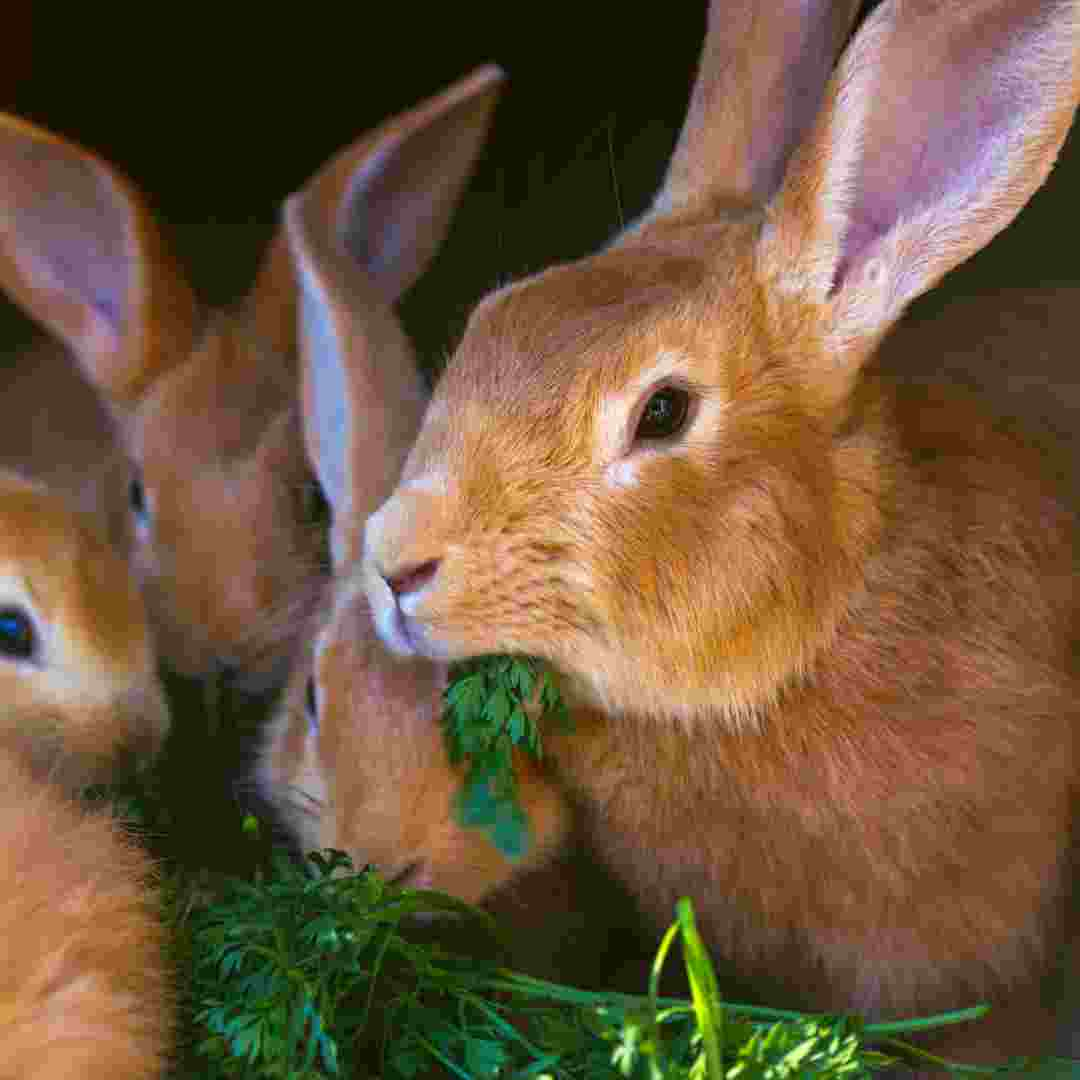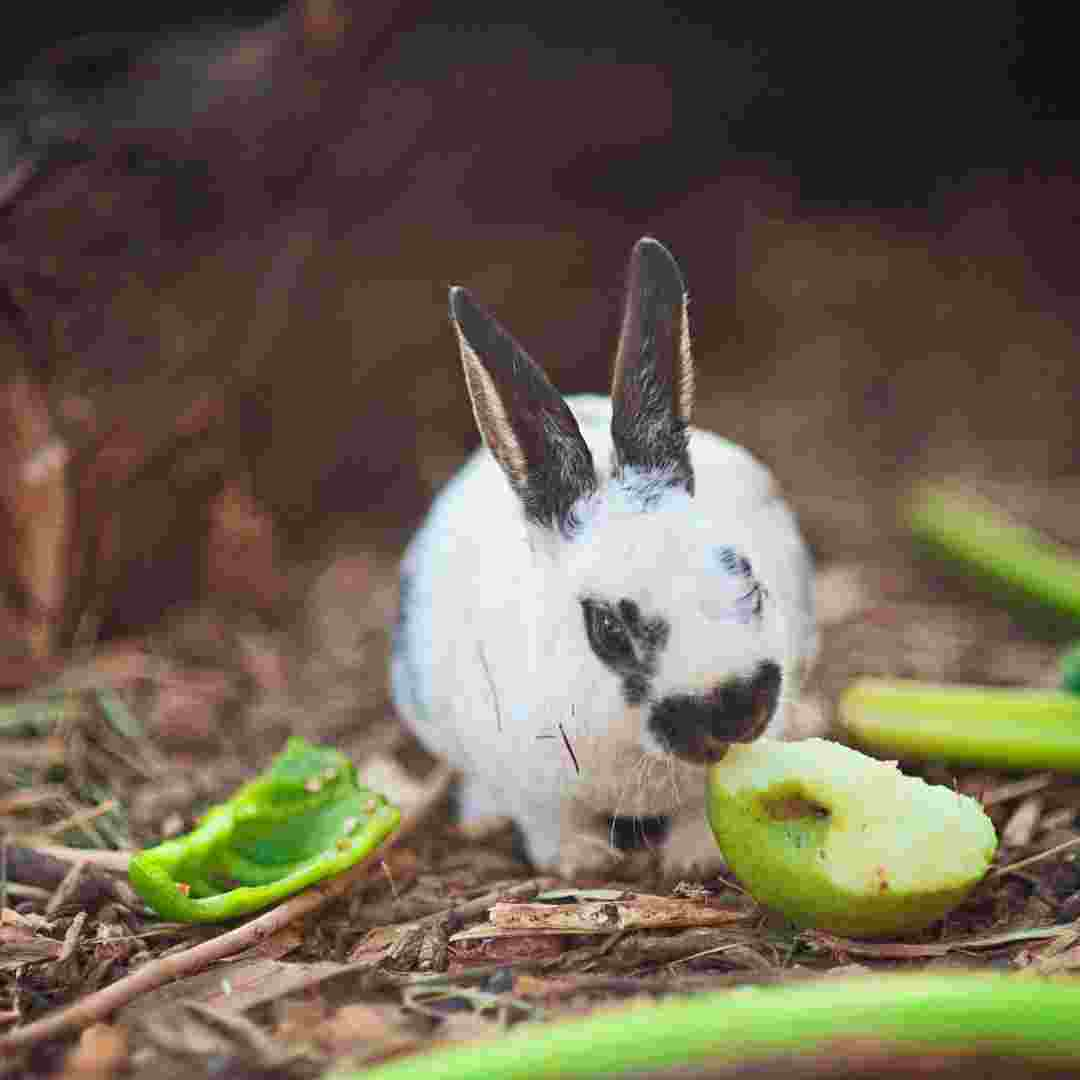Contents Table
Introduction
Benefits of a Fresh Vegetable-Rich Rabbit Diet
Feeding Rabbits Commercial Pellets: Pros and Cons
Benefits of Feeding Your Rabbit Fruits and Herbs
Rabbit Treat Overfeeding Dangers
Benefits of Feeding Rabbit Hay and Grass
Q&A
Conclusion
Introduction
Rabbits are popular pets worldwide for good reason. They are affectionate and low-maintenance. To be healthy, they need the correct nourishment like any pet. Rabbits are herbivores and should eat largely hay, fresh vegetables, and a few pellets. Rabbits may live long and healthy with the appropriate nutrition.
Benefits of a Fresh Vegetable-Rich Rabbit Diet
A diet rich in fresh veggies helps rabbits stay healthy by providing important nutrients. Rabbits need vegetables for vitamins, minerals, and fibre. Fresh veggies also have less calories and fat, making them suitable for obese rabbits.
Vitamin A, vitamin C, and calcium are abundant in vegetables. Vitamin A improves vision, while vitamin C boosts immunity. Strong bones and teeth need calcium. Bunnies need fibre to maintain their digestive systems.
Antioxidant-rich fresh veggies protect the body from free radicals. Free radicals harm cells and cause disease. These compounds are neutralised by antioxidants, reducing illness risk.
Fresh vegetables are low in calories and fat and provide critical nutrients. This makes them perfect for obese rabbits. Eat fresh veggies to keep rabbits healthy and reduce their chance of obesity-related health issues.
Finally, fresh veggies include fibre, which aids digestion. Fibre keeps the digestive system functioning, decreasing constipation and other digestive disorders.
In conclusion, rabbits benefit from a diet high in fresh vegetables since it supplies important nutrients and keeps them healthy. Healthy weight, obesity prevention, and digestive system function can be achieved by feeding rabbits a diet rich in fresh vegetables.
Feeding Rabbits Commercial Pellets: Pros and Cons
Commercial pellets can help you provide your rabbit a healthy diet. Pros and downsides must be considered before making this option.
Pros
Commercial rabbit pellets provide a balanced diet, which is a major benefit. They provide the protein, fibre, vitamins, and minerals your rabbit needs to keep healthy. Pellets are also supplemented with vitamins and minerals to guarantee your rabbit gets enough nourishment.
Easy storage and feeding are other pellet benefits. You may choose the right size and form for your rabbit. Pellets are also cheaper than other food, making them a good choice.
Cons
A negative of feeding your rabbit commercial pellets is their sugar and fat content. Lack of exercise can cause obesity and other health issues in rabbits. Some rabbits may not like pellets as much as other foods, therefore they may not eat them.
Pellets can sometimes be hard to digest. This can cause gas and bloating. Before giving your rabbit pellets, read the label because some may be allergic to particular components.
Finally, feeding your rabbit commercial pellets can make giving your pet a healthy diet easy. Pros and downsides must be considered before making this option. Before feeding your rabbit pellets, examine the pros and cons.
Benefits of Feeding Your Rabbit Fruits and Herbs
Adding fruits and herbs to your rabbit's diet can improve their health. Fruits and herbs include vitamins, minerals, and antioxidants that can benefit your rabbit's digestion, immune system, and disease risk.
A healthy digestive tract needs nutritional fibre, which fruits provide. Fibre helps your rabbit's digestive tract function correctly and reduces diarrhoea and constipation. Fibre also keeps rabbits full longer, preventing overeating.
Herbs are also good for rabbits. Herbs contain vitamins and minerals that enhance your rabbit's immune system and lower disease risk. Oregano, basil, and parsley are antioxidant-rich herbs that protect rabbits from free radical damage.
Fruits and herbs can make meals more fun for your rabbit and improve its health. The flavours and textures of fruits and herbs can make mealtime more fascinating for your rabbit.
Adding fruits and herbs to your rabbit's diet can improve their health. Fruits and herbs include vitamins, minerals, and antioxidants that can benefit your rabbit's digestion, immune system, and disease risk. Adding fruits and herbs to your rabbit's diet can also improve mealtime.
Rabbit Treat Overfeeding Dangers
As cherished pets, rabbits might be tempted to receive gifts for good behaviour or attention. Treats can help you bond with your rabbit, but too much can be harmful.
Rabbits should eat hay, fresh vegetables, and a few pellets as herbivores. Treats are high in sugar and fat and can create digestive troubles, so limit their intake. Too many snacks can create obesity, which can cause heart and joint problems.
In addition, snacks can damage teeth. Rabbit teeth grow continuously, so they eat hay and other fibrous things to wear them down. Too many snacks can cause tooth overgrowth, making eating difficult and other health difficulties.
Finally, treats can affect behaviour. If your rabbit is habituated to goodies, they may misbehave. This might make training them tough and frustrate you and your pet.
Remember to provide goodies moderately. Give your rabbit a special toy or additional playtime to reward them. This will keep them happy and healthy.
Benefits of Feeding Rabbit Hay and Grass
An herbivore, rabbits eat vegetation. Hay and grass are rabbits' main foods. Feeding your rabbit hay and grass improves digestion, dental health, and overall wellness.
Rabbits need hay. Its high fibre content supports a healthy digestive tract. Hay reduces rabbit hairballs, a severe health hazard. Hay also feeds rabbits with vitamins and minerals.
Rabbits also eat grass. Its high fibre content aids digestion. Rabbits need vitamins and minerals from grass. Also, grass keeps teeth healthy and strong. Rabbit teeth grow continuously, thus munching grass keeps them healthy.
Feeding your rabbit hay and grass might also benefit its health. Eating hay and grass keeps rabbits active, reducing boredom and stress. Hay and grass also stimulate rabbits' minds, keeping them healthy.
Finally, feeding your rabbit hay and grass improves digestion, dental health, and overall wellness. Rabbits need hay and grass regularly.

Q&A
1. What veggies can rabbits eat?
A: Rabbits consume carrots, celery, bell peppers, broccoli, and dark leafy greens.
2. Can rabbits eat fruit?
A: Rabbits can eat apples, pears, bananas, and melon.
3. Can rabbits eat hay?
Hay is essential to a rabbit's diet and should always be accessible.
4. Can rabbits eat nuts?
No, rabbits should not eat nuts because they are heavy in fat and might cause stomach difficulties.
5. Can rabbits eat bread?
A: Bread is too heavy in carbohydrates for rabbits and can cause stomach difficulties.
Conclusion
Rabbits, herbivores, can eat many plant items. They should eat hay, fresh vegetables, and a few pellets. Rabbits need a range of diets to receive all the nutrients they need. Additionally, clean water must always be available. Rabbits may be healthy and happy with the appropriate food.
